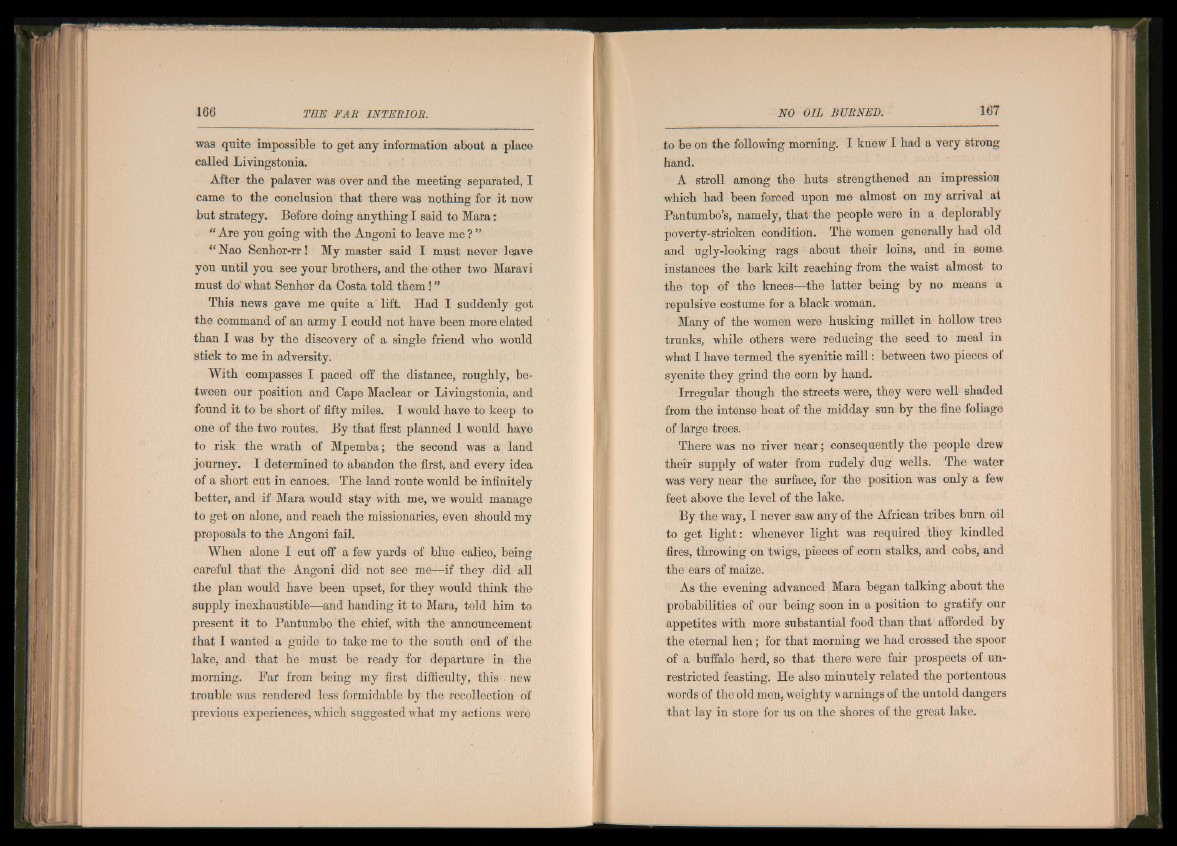
was quite impossible to get any information about a place
called Livingstonia.
After the palaver was over and the meeting separated, I
came to the conclusion that there was nothing for it now
but strategy. Before doing anything I said to Mara:
“ Are you going with the Angoni to leave me ? ”
** Nao Senhor-rr! My master said I must never leave
you until you see your brothers, and the other two Maravi
must do' what Senhor da Costa told them! ”
This news gave me quite a lift. Had I suddenly got
the command of an army I could not have been more elated
than I was by the discovery of a single friend who would
stick to me in adversity.
With compasses I paced off the distance, roughly, between
our position and Cape Maclear or Livingstonia, and
found it to be short of fifty miles. I would have to keep to
one of the two routes. By that first planned I would have
to risk the wrath of Mpemba; the second was a land
journey. I determined to abandon the first, and every idea
of a short cut in canoes. The land route would be infinitely
better, and if Mara would stay with me, we would manage
to get on alone, and reach the missionaries, even should my
proposals to the Angoni fail.
When alone I cut off a few yards of blue calico, being
careful that* the Angoni did not see me—if they did all
the plan would have been upset, for they would think the
supply inexhaustible—and handing it to Mara, told him to
present it to Pantumbo the chief, with the announcement
that I wanted a guide to take me to the south end of the
lake, and that he must be ready for departure in the
morning. Par from being my first difficulty, this . new
trouble was rendered less formidable by the recollection of
previous experiences, which suggested what my actions were
to be on the following morning. I knew I had a very strong
hand.
A stroll among the huts strengthened an impression
which had been forced upon me almost on my arrival at
Pantumbo’s, namely, that the people were in a deplorably
poverty-stricken condition. The women generally had old
and ugly-looking rags about their loins, and in some,
instances the bark kilt reaching from the waist almost to
the top of the knees—the latter being by no means a
repulsive costume for a black woman.
Many of the women were husking millet in hollow tree
trunks, while others were reducing the seed to meal in
what I have termed the syenitic m ill: between two pieces of
syenite they grind the corn by hand.
Irregular though the streets were, they were well shaded
from the intense heat of the midday sun by the fine foliage
of large trees.
There was no river near; consequently the people drew
their supply of water from rudely dug wells. The water
was very near the surface, for the position was only a few
feet above the level of the lake.
By the way, I never saw any of the African tribes burn oil
to get lig h t: whenever light was required they kindled
fires, throwing on twigs, pieces of corn stalks, and cobs, and
the ears of maize.
As the evening advanced Mara began talking about the
probabilities of our being soon in a position to gratify our
appetites with more substantial food than that afforded by
the eternal h en ; for that morning we had crossed the spoor
of a buffalo herd, so that there were fair prospects of unrestricted
feasting. He also minutely related the portentous
words of the old men, weighty w arnings of the untold dangers
that lay in store for us on the shores of. the great lake.